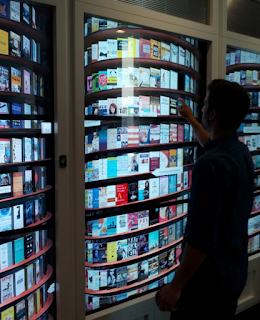 |
| 2D digital bookshelf [Source: http://www.authormedia.com/wp-content/uploads/2009/06/shelfari.jpg] |
Digital media give us the freedom to explore new ways to display books. Google engineers created the 3D "Infinite Bookshelf". It is a compromise between a traditional bookshelf view while accommodating large amounts of books (One effect of switching from physical books to eBooks is that one can store a much larger collection of books than one would ever own in physical form). The "Infinite Bookshelf" is an infinite 3D helix that you can spin side-to-side and up and down with your mouse. It holds 3D models of more than 10,000 titles from Google Books.
 |
| Google 3D Infinite Bookshelf [Source: http://farm7.static.flickr.com/6219/6258962915_b1b16ef550_b.jpg] |
This short video explains the functionality of the bookshelf.
Without physical bookshelves, there is no more shelf-snooping when you visit somebodies home or office. The books we have on display show our intellectual heritage and interests. Discovering that a new acquaintance read the same book is a great start for a conversation. But how can that happen if all our books are stored electronically? Do we give a new acquaintance acces to our shelfari, goodreads, or calibre accounts? Will we have wall-sized touch-screens displaying our digital libraries?
 |
| Browsing Google's Infinite Bookshelf (at Google NY) |
While Google's Infinite Bookshelf is an interesting concept, I wonder why a digital 3D library couldn't look more like this:
.jpg) |
| Clementinum National Library (Czech Republic) |
 |
| Jedi Temple Library (aka Trinity College Library, Ireland) |
See more pictures of beautiful libraries here and here.